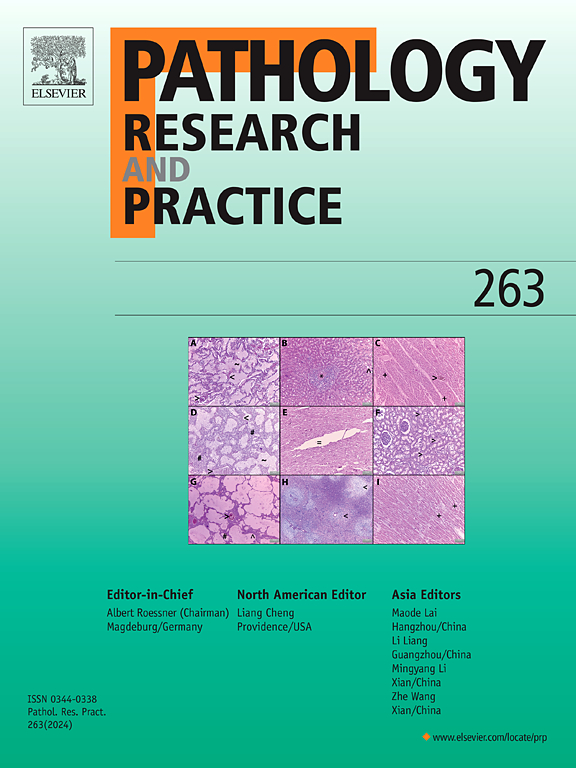Nonsense-mediated mRNA decay: Physiological significance, mechanistic insights and future implications
IF 2.9
4区 医学
Q2 PATHOLOGY
引用次数: 0
Abstract
Nonsense-mediated mRNA decay (NMD) is a quality control mechanism that detects and degrades premature aberrant transcripts and importantly, it also takes part in gene expression regulation by regulating the endogenous transcripts. NMD distinguishes aberrant and non-aberrant transcript by looking after the NMD signatures such as long 3′ UTR. NMD modulates cellular surveillance and eliminates the plausible synthesis of truncated proteins as because if the aberrant mRNA escapes the surveillance pathway it can lead to potential negative phenotype resulting in genetic diseases. NMD involves multiple proteins and any alteration or mutation within these proteins results in various pathophysiological consequences. NMD plays a complex role in cancer, it can either aggravate or downregulates the tumour. Some tumours agitate NMD to deteriorate mRNAs encoding tumour suppressor proteins, stress response proteins and neoantigens. In other case, tumours suppress the NMD to encourage the expression of oncoproteins for tumour growth and survival. In this review, we have shed light on the core and associated proteins of NMD, further summarized the mechanism of the NMD pathway and also described the implications of mutations in NMD factors resulting in severe pathological conditions including neurodevelopmental disorder, effects on male sterility and cancer. Understanding the complexities of NMD regulation and its interaction with other cellular processes can lead to the development of new interventions for various diseases. This review summarizes the current understanding of NMD and its role in controlling various cellular processes in both development and disease.
有义介导的 mRNA 衰变:生理意义、机理认识和未来影响
无义介导的 mRNA 降解(NMD)是一种质量控制机制,可检测和降解过早出现的异常转录本,重要的是,它还通过调节内源转录本参与基因表达调控。NMD 通过观察 NMD 标志(如长 3′ UTR)来区分异常和非异常转录本。NMD 可调节细胞监控,消除似是而非的截短蛋白合成,因为如果异常 mRNA 逃过监控途径,就会导致潜在的负面表型,导致遗传疾病。NMD 涉及多种蛋白质,这些蛋白质的任何改变或突变都会导致各种病理生理后果。NMD 在癌症中扮演着复杂的角色,它可以加重或减轻肿瘤的病情。一些肿瘤会刺激 NMD 使编码肿瘤抑制蛋白、应激反应蛋白和新抗原的 mRNA 发生恶化。在另一种情况下,肿瘤会抑制 NMD 以促进肿瘤生长和存活所需的癌蛋白的表达。在这篇综述中,我们阐明了 NMD 的核心蛋白和相关蛋白,进一步总结了 NMD 途径的机制,还描述了 NMD 因子突变导致神经发育障碍、影响男性不育和癌症等严重病理状况的影响。了解 NMD 调节的复杂性及其与其他细胞过程的相互作用,有助于开发治疗各种疾病的新干预措施。本综述总结了目前对 NMD 及其在发育和疾病过程中控制各种细胞过程的作用的理解。
本文章由计算机程序翻译,如有差异,请以英文原文为准。
求助全文
约1分钟内获得全文
求助全文
来源期刊
CiteScore
5.00
自引率
3.60%
发文量
405
审稿时长
24 days
期刊介绍:
Pathology, Research and Practice provides accessible coverage of the most recent developments across the entire field of pathology: Reviews focus on recent progress in pathology, while Comments look at interesting current problems and at hypotheses for future developments in pathology. Original Papers present novel findings on all aspects of general, anatomic and molecular pathology. Rapid Communications inform readers on preliminary findings that may be relevant for further studies and need to be communicated quickly. Teaching Cases look at new aspects or special diagnostic problems of diseases and at case reports relevant for the pathologist''s practice.

 求助内容:
求助内容: 应助结果提醒方式:
应助结果提醒方式:


